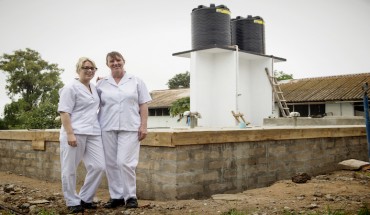Doctors have urged hospitals around the world to reconsider the type of fluids used to treat children gravely ill with sepsis.
In a new study, researchers from Imperial College London found saline fluids commonly used to help stabilise critically ill children may trigger the blood to become more acidic, and lead to organ failure.
The team, who published their work in The Lancet Respiratory Medicine, urge hospitals across the UK – and the world – to consider swapping saline fluids for a different type of so-called buffered solution that helps prevent the blood becoming too acidic.
Although the research studied data from over 3000 children with malaria or sepsis (blood poisoning triggered by severe infection) in Africa, the research team say the findings could apply to all critically ill children and adults.
When a critically ill patient is brought into hospital, medical teams often give the patient very large amounts of fluid rapidly into their vein through a drip. This is called a fluid ‘bolus’, and helps increase their blood pressure and heart rate, and ensure blood is still pumped around the body.
The fluids most commonly used in hospitals around the globe are called saline (a type of salt water), or 5% albumin (a saline solution that contains albumin protein).
These fluids were always assumed to be the most effective at stabilising a patient, until an Imperial College-lead 2011 trial of 3000 children – called the FEAST trial – suggested otherwise. The trial, conducted in Kenya, Uganda and Tanzania, compared rapidly giving a bolus of saline or 5% albumin, to giving much smaller amounts of fluid over a longer period of time.
The research team hoped the trial would reduce the number of the child deaths from infection, but were shocked to find giving a large fluid bolus was associated with a higher death rate. An independent panel decided to stop the trial early, while pointing out that children in the trial still had a better chance of survival than is normally the case in Africa, in part due to extra training given to hospital staff.
In the latest study, the scientists wanted to investigate why the saline fluids were associated with a higher risk of death, and if these findings could apply to other children around the world.
By analysing the data from the FEAST trial, and comparing this with data from over 18,000 children who attended a UK hospital and other hospitals in Malawi and South Africa, the team found that the use of saline or 5% albumin had a number of adverse effects.
The research, funded by the Medical Research Council, Department for International Development, and the National Institute for Health Research Imperial College Biomedical Research Centre, found that although the fluid bolus did improve heart rate and blood pressure, the solution also harmed lung function, and increased brain swelling and acidity of the blood – which together contributed to the increased mortality observed in the FEAST trial.
The researchers stress that fluids are still a vital part of resuscitation, and these findings apply mainly to critically ill patients. They say saline and 5% albumin may have less adverse effects in moderately ill patients, but suggest solutions that contain buffering components, and less chloride (which can cause blood to become acidic), should be used in gravely ill individuals.
The team add that much of the FEAST data came from children who did not have access to an intensive care unit – and therefore the chance of a fluid bolus increasing the chance of death is much smaller in settings with comprehensive medical facilities. But they add that even in these conditions, the use of a bolus of saline or 5% albumin could still worsen a child’s condition.
They say further trials are now urgently needed to investigate the use of alternative fluids that contain buffers and less chloride, as well as how much of the fluid to use.
Professor Michael Levin, from the Department of Medicine at Imperial College London, who led the study, explained: “This study suggests we need a re-think of how we resuscitate patients – what volume of fluid we give to patients, and the type of fluid we give to patients”.
“This study suggests we need a re-think of how we resuscitate patients – what volume of fluid we give to patients, and the type of fluid we give to patients”.
“The FEAST trial provided the first clear evidence that administration of a rapid ‘bolus’ of normal osaline or albumin to critically ill patients was harmful if advanced intensive care support was not available. Our new analysis has identified the mechanisms through which fluid bolus caused harm. Although the bolus fluids had the desired effect in improving cardiovascular function, this came at the cost of a range of unexpected adverse effects including worsening lung function, increased brain swelling and most importantly the blood becoming more acidic.
“The effect of high chloride fluids like normal saline and 5% albumin on blood acidity can be prevented by using alternative fluids that are lower in chloride concentration. Trials are now needed to establish whether alternative resuscitation fluids, used in smaller amounts, can achieve the beneficial effects on cardiovascular function without the adverse effects on lungs, brain and blood acidity.”
Dr Aubrey Cunnington, a co-author of the study from Imperial’s Department of Medicine, added: “The findings and implications of the FEAST trial have perplexed the medical community. Uncertainty about the mechanisms by which fluid bolus increased mortality in FEAST is probably one of the main reasons why the trial findings have not resulted in as many changes in international guidelines as might be expected. We found evidence that normal saline or 5% albumin fluid boluses worsened the function of multiple organs in the body.”
“The findings and implications of the FEAST trial have perplexed the medical community. Uncertainty about the mechanisms by which fluid bolus increased mortality in FEAST is probably one of the main reasons why the trial findings have not resulted in as many changes in international guidelines as might be expected. We found evidence that normal saline or 5% albumin fluid boluses worsened the function of multiple organs in the body.”
Professor Simon Nadel, a further co-author from Imperial’s Department of Medicine, and consultant in Paediatric Intensive Care at Imperial College Healthcare NHS trust said: “The FEAST study showed definitively for the first time that rapid fluid administration led to a higher mortality in children who were already seriously ill, than slower fluid administration. It has to be emphasised that this finding occurred in an environment where there was no access to advanced intensive care support.
It is now clear that we have to be aware of the rate and type of fluid resuscitation for critically ill patients, and it is vital that properly conducted studies into the most appropriate fluid resuscitation in the critically ill patient are carried out as soon as possible.”
- New lipid-based pathway discovered as key to memory formation - 25th June 2025
- Crucial link could explain how Alzheimer’s takes hold - 25th June 2025
- Understanding Your Mind Can Improve Daily Life - 25th June 2025







